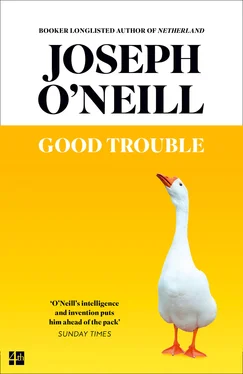Problem: “meditation on” is a cliché. “What it means to” is a cliché.
The very notion of a problem, colon, is a cliché.
“The very notion of” is a cliché.
“Cliché” strikes one as a cliché.
As does “strikes one.”
And “As does.”
Ditto inverted commas.
Ditto “ditto.”
He did not write Merrill back. He did not put his name to the poetition.
As soon as he had not done these things, he rose up from his chair. He went not to the window but to the area between the chair and sofa. He stood there with hands balled into shaking fists. Silently and exultantly he roared, Never give in. Never not resist.
The Trusted Traveler Contents Cover Title Page Copyright Dedication Pardon Edward Snowden The Trusted Traveler The World of Cheese The Referees Promises, Promises The Death of Billy Joel Ponchos The Poltroon Husband Goose The Mustache in 2010 The Sinking of the Houston About the Author Also by Joseph O’Neill About the Publisher

For almost a decade, Chris and I have received an annual visit from one of my former students, Jack Bail. This year is different. When, as usual, he e-mails to invite himself over, I reply that “our traditional dinner” can “alas” no longer take place: six months ago, Christine and I moved to Nova Scotia.
Jack Bail writes back:
Nova Scotia? Canada’s Ocean Playground? I’m there, Doc. Just say when and where.
“Oh no,” Chris says. “I’m so sorry, love.”
It’s I who should say sorry to Chris. Not only will she have to cook for Jack Bail but she will also have to handle Jack Bail, because, even though I’m supposedly the one who’s Jack Bail’s friend, it’s Chris who retains the details of Jack Bail’s life story and the details of what transpired in the course of our meals with him, and who is able to follow what Jack Bail is saying or feeling. For some reason, almost anything that has to do with Jack Bail is beyond my grasp. I can’t even remember having taught anybody named Jack Bail.
“And I guess Chris will be coming,” Chris says, confusingly. “His wife,” Chris says.
Of course—Jack Bail’s wife, like my Chris, is a Chris by way of Christine. Which is irritating.
I say, “You never know. Maybe he won’t be able to make it.”
Chris laughs, as well she might. Jack Bail always turns up. Without fail he marks the end of the tax season by eating at our table. It is always a strangely fictional few hours. Only after Jack Bail has left does our life again feel factual.
Chris’s long-standing opinion on the Jack Bail situation is that I should effectively communicate to him that I don’t wish to see him. It’s not her suggestion that I socially fire him in writing—as she acknowledges, “That’s pretty much psychologically impossible”—but that I make use of the well-understood convention of e-mail silence.
I’ve tried it. E-mail silence only prompts Jack Bail to switch to pushy text messages. For example:
Hi about this dinner thing. Just let me know details as soon as you have them, no rush.
This obdurate memorandum and others like it—
Dinner this month? Next month? All good:)
—weigh on me so heavily that in the end it’s just easier to spend an evening with the guy. The truth isn’t so much that Jack Bail is a terrible or unbearable fellow but that Jack Bail falls squarely into the category of people whom Chris and I really don’t want to see anymore as we hit our mid-sixties and apprehend the finitude and irreversibility of human time as an all-too-vivid personal actuality and not as a literary theme to be discussed in high school classes devoted to The Count of Monte Cristo or The Old Man and the Sea. A central purpose of moving to this Canadian coastal hilltop has been to shed our skins as New Yorkers and finally rid ourselves of the purely dutiful associations that, it seemed to me especially, overcrowded our day-to-day existences, which, even discounting work, apparently amounted to one interaction after another with individuals who demanded that we transfer our time to them, often for no better reason than that our paths had once crossed or, would you believe it, that their very demand for our time constituted such a crossing of paths.
(Illustration: A, who claims to be a friend of a friend, informs me by e-mail that he’s thinking of applying for a job at the school where Chris and I teach. Could he pick my brains over coffee? Further illustration: B writes to Chris to say that her child once attended the school. Could Chris help B get an overseas research fellowship? Exercising what is, I believe, a universally accepted right to reasonable personal autonomy, we choose not to answer these approaches; whereupon, we find out, both A and B tell people that we’re rude, selfish, full of ourselves, etc. In A’s and B’s minds, their making unilateral contact with us means that we, the contactees, are somehow in their debt. The difference between Chris and me is that she doesn’t let this stuff get to her, whereas I stupidly waste a lot of time and emotion being bothered by the ridiculous injustice and hostility of it all.)
I won’t even begin to describe how many hours and years we devoted to the parental body—the Hydra, as Chris named it. You cannot defeat the Hydra. You can only flee it. None of this is to say that we’re refugees; but it can’t be denied that we’ve retired, and that to retire means to draw back, as if from battle.
The good news is Jack and Chris Bail will not be sleeping over. My Chris took it upon herself to warn Jack Bail and his Chris that there was no room at our inn, so to speak, to which Jack Bail responded:
No worries.
We’ll take him at his word. The other good news is that Ed and Fran Joyce, new Nova Scotia acquaintances, will join us for the dinner in order to absorb the Bails, although of course the Joyces aren’t aware that this is part of their function. We don’t know the Joyces at all well, but they strike us as good sports. Also, they hosted a kind of welcome event for us, and so we owe them dinner, arguably: one day soon after we arrived, a hamper filled with good things was left at our front door, together with an invitation to join members of “the community” for drinks and nibbles. We freely accepted the invitation—we hadn’t come here to be recluses, after all—and enjoyed the occasion, although we were, and still are, a little wary of and astonished by and ironical about the prospect of joining a retiree crowd. Our plan is to have a year of contemplative idleness, after which we’ll have a better idea of what to next get up to. We’re far from elderly, after all. Time is not yet a victorious enemy.
Shortly before everyone is due to turn up, Chris and I take to the deck and get a head start on the wine, which is white and cold. “I wonder what Jack will have to say about this place,” Chris says. “Yes,” I say. “That’s something to look forward to.” She has reminded me of Jack Bail’s chronic amazement at our old apartment in Hudson Heights. Every time he came over, from Brooklyn, he would say something like, Hudson Heights? Who knew this neighborhood even existed? Who lives up here? Oboe players? It’s like I’m in Bucharest or something. Should I buy here?
This kind of thing is all fine, needless to say, and absolutely within my tolerance levels in relation to schoolchildren, although of course Jack Bail, who must be in his late thirties, and if memory serves is balding, is no longer a schoolboy. But his personal qualities are beside the point. The point is that Jack Bail is uncalled-for.
It’s a mild, semi-sunny, slightly windy June evening. “Just look at that,” I declare for about the millionth time since we moved into our cottage, which offers a panorama of a pond, green seaside hills, a semicircular bay, and a sandbar—or spit, perhaps. To the south, there’s a wooded headland that may or may not be a tombolo. It’s my intention to investigate this vista systematically, since it feels strange to look out every day and basically not understand what I’m looking at. Right now, for example, I’m observing an extraordinary horizontal triplex: in the offing, a distinctly ultramarine strip of ocean water is topped by a dull-blue band of unclassifiable vapor, itself topped by a purely white stratum of cloud. Then comes sky-blue air and, almost on top of our own hill, an enormous hovering gray cloud. This outlandish hydroatmospheric pileup, which is surely not unknown to science, leaves me at a terminological and informational loss that’s only intensified when I look at the bay itself, where the migrant and moody skylight, together with the action of the wind and current, I suppose, and maybe differences in the water’s depth and salinity, constantly pattern and texture and streak the aquatic surface. It’s unpredictable and beautiful. Sometimes the bay, usually blue or gray, is thoroughly brown, other times it has Caribbean swirls of aquamarine or is colorlessly pale, and invariably there are areas where the water is ruffled, and there are smooth or smoother areas of water, and areas that are relatively dark and light, and dull and brilliant, and so forth, ever more complexly. There must be some field of learning that can help me to better appreciate these phenomena.
Читать дальше













